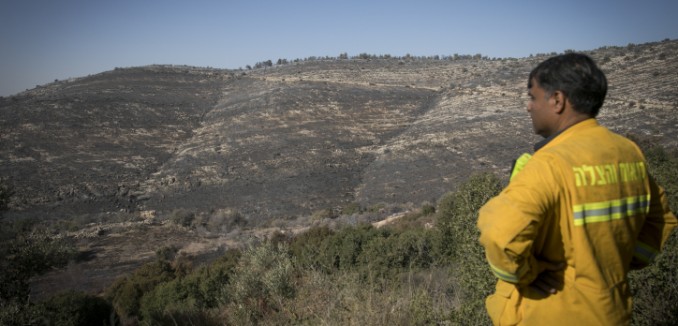Israeli officials have reported that the fires that raged in the country’s central and northern regions last week were largely brought under control, and that they are now focusing on determining the source of the blazes and the damage caused.
Yoram Levy, the spokesman for Israel’s fire and rescue services, told Agence France-Presse on Sunday that “there are no active sites left” and that “since last night [Saturday] it’s been pretty calm.”
Although the situation was under control, fires were reported on Sunday near the southern city of Kiryat Malachi and other locations.
Last week’s fires predominantly hit the Haifa and Jerusalem hills areas. In Haifa, around 80,000 people were evacuated from their homes and some 700 acres were destroyed. In total, as much as 32,000 acres of natural forests and brush were destroyed, around 30 percent more than the area destroyed by the 2010 Carmel Forest fire.
At least 700 homes were damaged or destroyed by the fires and 122 people have been treated for injuries, mainly smoke inhalation. There have been no reported deaths.
Over 1.5 million tons of fire retardant materials and liquids have been used since Saturday night. With Israel’s fire-fighting forces stretched, countries including the United States, Russia, Turkey, Greece, France, Spain, and Canada all sent crews to aid the effort. The Palestinian Authority (PA) also sent eight fire engines to help extinguish the fires.
Israel’s Prime Minister Benjamin Netanyahu on Sunday telephoned PA President Mahmoud Abbas to thank the PA for their assistance.
Although dry conditions and high winds are thought to have been a major cause of the fires, Israeli officials say that arson attacks by Palestinian and Arab-Israeli nationalists were also to blame. A police statement said they suspect that between 30 to 40 of the 90 fires investigated so far were caused by arson, with 23 arrests already made.
An unnamed Israel Police source told Ynet that “the people who carry out the act [of arson] aren’t from some guiding hand,” and the arsons are likely uncoordinated.
(via BICOM)
[Photo: BICOM]




